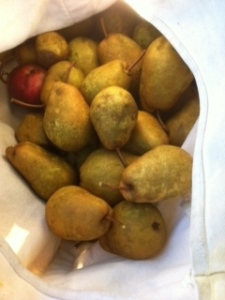My neighbor’s lawn is now a rolling green expanse unmarred by anything so inconvenient as an apple tree. At a time when everyone else seems to be ripping out their lawns to plant food, they are reaching for suburbia. It’s already starting to be hard to remember when part of that lawn was a paddock that held a horse and some cows. And that right next to the paddock, next to the road, was an apple tree grafted to two varieties, red and russet, loaded with fine, sweet fruit each fall.
I try not to look when I drive by and I’m almost over it. Really. Especially since I discovered something I should have noticed 10 years ago when we moved here: another neighbor’s epic orchard. These neighbors once were dairy farmers, the 10th generation to work their land. They had stopped farming about 10 years before we showed up, but the infrastructure is still there, waiting, I think, for another farm family. At least that’s what I hope.
My neighbor’s father also was an orchardist and planted at least 100 trees on their property–apples, yes, and pears too. But he passed away about five years ago at the ripe old age of 94 and even before then no one had really tended the trees. He supplied scion wood for unusual varieties to Fedco, a growers cooperative. He was part of our little town’s rich orcharding history, which includes apples invented here, apples shipped all over, apples pressed into cider hard and sweet. I was too shy to introduce myself, but of course I wish I had, because he might have taught me to make cider or shared the orchard map with me.
This fall, without the fabulous red apples to fill my garage, I asked if I could pick in their remaining orchard. “Oh we haven’t sprayed,” my neighbor Clint said. “They’re no good. But go ahead.” It turns out they’re just fine, many of them, even though the trees are in desperate need of pruning. And there’s a pear tree, a massive old thing covered in fruit that with just a little encouragement would be big and even more plentiful. I have no idea what most of the varieties are: there’s a russet, and lots of red apples, a golden delicious which might have supplied the scion wood for my own tree. I’m not sure I want to tell Clint about this bounty, though he surely knows.
Why did it take me 10 years to realize how very rich we are here? The other day on an unusually warm afternoon, I hiked down in my green wellies to explore and pick. I savored the sun and smell of fruit in the longish grass, the chip notes of migrating songbirds, the trees that give even when we ignore them. Every time I reached for one pear, three more rained down, a cascade of fruit, firm but perfectly ripe, sugary sweet beyond their bosc-like skins.
I’m glad I discovered this before it’s lost, before the farm slips out of the family and I no longer have access or the land is cleared for houses. I’m hoping it doesn’t come to that because I swear I can hear whispers while I pick, voices coming down through history to tell what this place meant and what it could be again.

